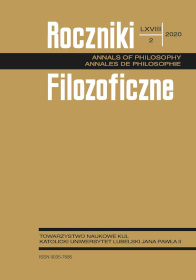The Curious Sensations of Pain, Hunger and Thirst. Reliabilism in the Second Part of Descartes’ Sixth Meditation
The Curious Sensations of Pain, Hunger and Thirst. Reliabilism in the Second Part of Descartes’ Sixth Meditation
Author(s): Stefaan E. CuypersSubject(s): Philosophy, History of Philosophy, Epistemology, Renaissance Philosophy, Early Modern Philosophy
Published by: Towarzystwo Naukowe KUL & Katolicki Uniwersytet Lubelski Jana Pawła II
Keywords: bodily sensations; errors of nature; nature’s teachings; reliabilism; the empirical space of causes, the logical space of reasons
Summary/Abstract: This paper discusses the epistemic status of bodily sensations—especially the sensations of pain, hunger and thirst—in the second part of Descartes’ Sixth Meditation. It is argued that this part is an integral component of Descartes overall purely epistemological project in the Meditations. Surprisingly perhaps, in contrast with his standardly taken infallible, internalist and foundationalist position, Descartes adopts a fallibilist, externalist and reliabilist position as regards the knowledge and beliefs based on bodily sensations. The argument for this conclusion is justified by an analysis of both the criterion of nature’s teachings and the concept of true errors of nature in terms of Wilfrid Sellars’ distinction between the logical space of reasons and the empirical space of causes.
Journal: Roczniki Filozoficzne
- Issue Year: 68/2020
- Issue No: 2
- Page Range: 139-154
- Page Count: 16
- Language: English

